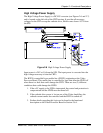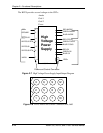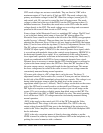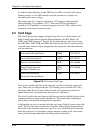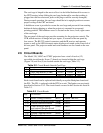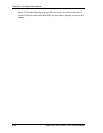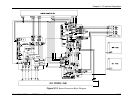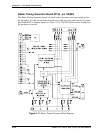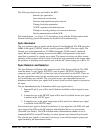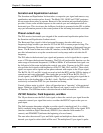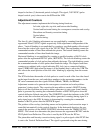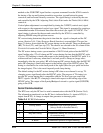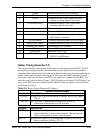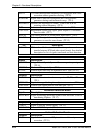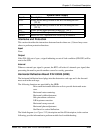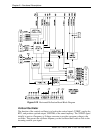
Chapter 2—Functional Description
Model 330, 340SC and 370SC Service Manual 2-19
The following functions are provided by the RTG:
Internal sync generation.
Sync detection and selection.
Serration and equalization pulse removal.
Timing clock pulse generation.
VSYNC separation and field detection.
Timing for several geometry and correction functions.
Serial communication with the SCB.
The block diagram ( see Figure 2-11) description, along with the I/O description in the
Section following, provide information for module-level troubleshooting.
Sync Generator
The sync generator takes its input from the System Controller Board. The SCB provides a
4MHz clock signal, SYSCLK, which is used to generate a HDTV-like sync signal. The
internal sync signal generated is a 33.33KHz horizontal, 59.3Hz vertical, interlaced
signal. Because simply counting down from the 4MHz clock generates it, the actual
signal that is produced is a square wave signal. The square wave does not affect normal
operation of the projector but will cause a vertical bar to be generated on the screen when
the projector is operating on the internal sync with the DC restore timing set to BP or TL.
Sync Detector and Selector
The Sync Detector and Selector take inputs from the Video Processor Board. The VPB
sends the three (3) sync signals, SGSYNC (sync on green), HCSYNC (horizontal or
composite sync), and VSYNC (vertical sync only) of any polarity to the RTG. These are
the sync signals that come from the external source and are what the projector will gen-
lock to when they are available. The sync selector uses a pre-determined priority to
determine which of these sync signals will be used, based on which signals are present at
the input.
The pre-determined priority to determine which sync signals used is:
1.
Separate H and V sync will be used if both are available on their respective sync
inputs,
2.
Composite sync on the HSYNC input will be used if available and no sync signal
is present on the VSYNC input,
3.
Composite sync on the green image input will be used if no coherent sync signal
is available on the HSYNC input.
If no external sync signal is detected on the three (3) sync input lines, the RTG will send
out a signal to the SCB via the IIC interface indicating that there is no sync present
(/External Sync Detect). The SCB will then make a determination whether or not to
command the RTG, via the IIC interface, to select internal sync (Internal Sync Forced).
The selected sync signal(s) is inverted, if necessary, to provide the negative-going sync
signal needed by the downstream circuits.



